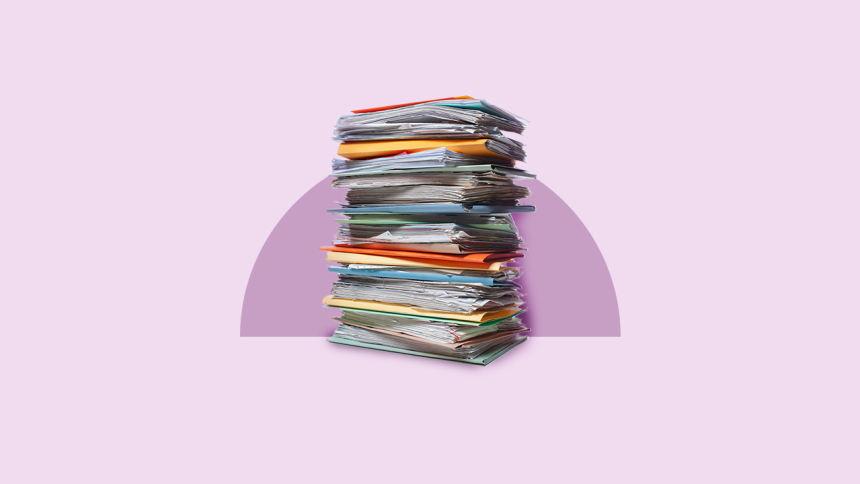Once you file your taxes, you should plan to keep your tax returns for a minimum of three years from the date you filed your original return. But there are situations where you should keep your tax returns even longer.
How long should you keep your tax returns?
How long do you need to keep these documents? That varies based on a few factors. And keep in mind that, while the timelines below reflect federal guidelines, your state tax authority might have different standards.
Three years
If you’re an employee who receives a W-2 and your taxes aren’t complicated, your timing likely can be short.
“Taxpayers should keep tax records for at least three years. The IRS has a three-year statute of limitations to audit your return and assess additional tax,” says Mark Weiskind, founding partner and senior wealth manager at Fairway Wealth Management. Plus, “taxpayers have three years from the date a return is filed to claim a refund due.”
While that rule also applies to self-employed and freelance workers, there is an exception. If you claim the sale of equipment, it’s important to retain the records for at least three years after you report the sale, says Jave Ragan, senior wealth advisor at Bordeaux Wealth Advisors.
Keep details related to the purchase and sale, including what you initially paid for the equipment and depreciation while it was owned (how the equipment was expensed for tax purposes), since those details could be difficult to reconstruct in the event of an audit.
Self-employed or freelance workers should also keep financial records of business income and expenses — that means detailed records, including where income came from, receipts for expenses, mileage logs for vehicle deductions, etc.
“All of this information is likely to be requested in the event of a tax audit,” Ragan says. “The more detailed substantiation you are able to provide, the more smoothly the audit is likely to proceed.”
Six years
That three-year rule doesn’t apply to everyone, though.
The statute of limitations is extended to six years if your adjusted gross income is underreported by more than 25 percent, Weiskind says.
And if you file a fraudulent return, the statute of limitations doesn’t ever expire.
Seven or more years
If you file a claim for a loss from worthless securities or bad debt deduction, you need to keep the records for 7 years, according to the IRS.
The IRS’s statute of limitations rises to 10 years from the date a return is processed to collect on a tax balance due, Weiskind says. However, both the taxpayer and the IRS can extend the 10-year period, for instance if there is litigation or an offer in compromise.
Tax documents you should keep
Generally, the IRS recommends keeping all documents that prove how much income you earned and anything that supports credits or deductions you claim. Don’t worry about keeping every single document, though. For example, your W-2 form will summarize how much you’ve earned, so you don’t need to file away every single pay stub.
Here’s a rundown of some of the basic tax documents you should keep on file for three years.
Income
Your taxes start with how much you made, so keep a record of all the dollars you were paid in a given year.
- W-2 forms
- 1099 forms
- K-1 forms
Expenses
If you’re self-employed or a freelance worker, keep evidence of all the money you had to spend to keep your business going.
- Sales slips
- Invoices
- Receipts
- Canceled checks or other proof of payment
- Annual bank statements
Investments
If you have an investment portfolio, those documents need to be preserved, too.
- Annual brokerage statements
- 1099 forms
- 2439 forms
Retirement accounts
As you plan for retirement, keep the IRS informed of your account activity.
- Form 5498, Roth and traditional IRA contributions
- Form 8606, nondeductible IRA contributions
- Annual statements
- 401(k) and other company-sponsored plan statements
- Form 1099-R distribution records
Health insurance
When you file your taxes, you don’t have to submit proof of your health insurance. However, you may still need to show the IRS that you were covered.
- Form 1095-A (Health Insurance Marketplace Statement)
- Form 1095-B (Health Coverage)
- Form 1095-C (Employer-Provided Health Insurance Offer and Coverage)
- Insurance cards
- Statements from your insurance provider
- Payroll statement that shows money was deducted for your health insurance
What if you don’t keep your tax records?
What’s the worst thing that can happen if you lose your tax records? If you’re audited, you might owe money.
“If a taxpayer is unable to provide records to substantiate income or deductions, the IRS may disallow information reported on a return,” Ragan says. “This can result in additional taxes, penalties and interest.”
How to get rid of your tax records
When it’s finally time to wave goodbye to that mountain of paperwork, it’s important to remember that getting your tax documents would be a criminal’s dream come true. These documents include your name, address, Social Security number and all the information needed to steal your identity, so getting rid of them requires extra attention.
“We highly recommend tax records get shredded once they are no longer required to be maintained,” Weiskind says. “If you don’t own a shredder, there are sometimes community shredding events, as well as paid shredding services.” UPS, for example, will shred your documents.
Learn more:
Read the full article here














